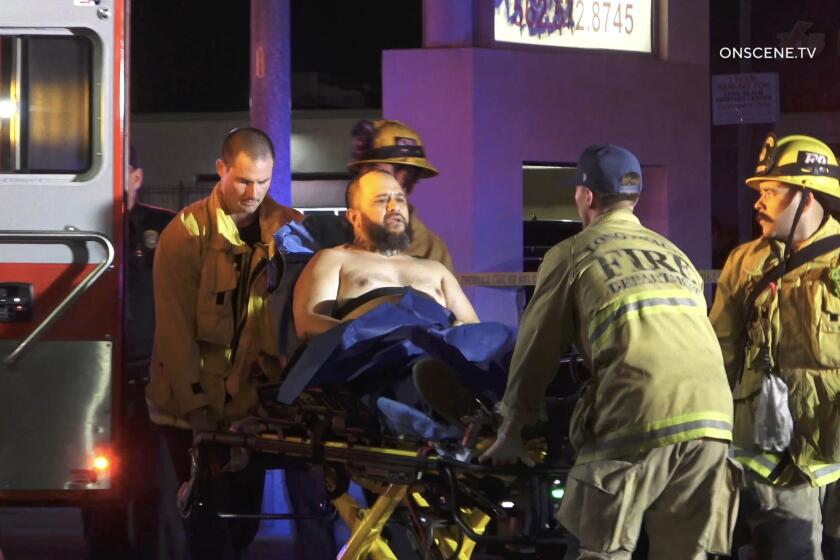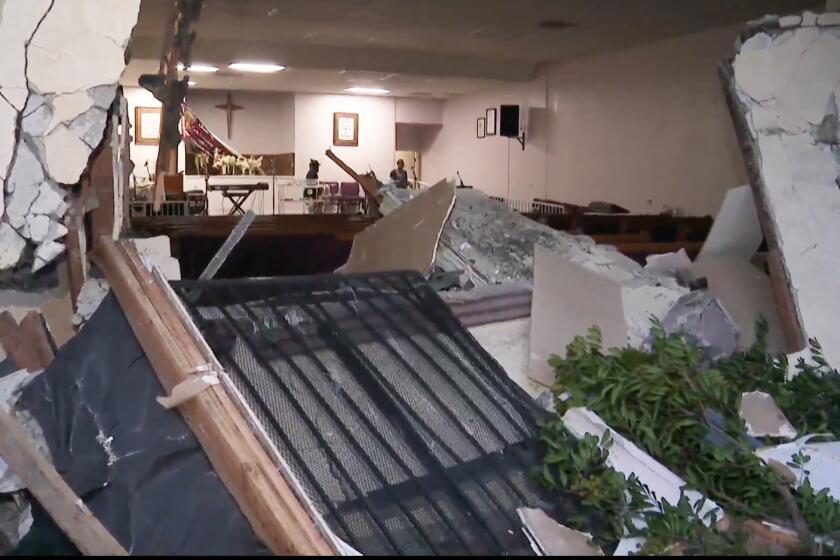Funding Loss Threatens to Close Eastside Homeless Shelter : Services: After 13 years, the program at Dolores Mission, a godsend for day laborers and migrant workers, may not survive the month.
The men straggle into the small Eastside church as the evening sun dips behind the downtown skyscrapers. Exhausted and dirty, they take turns showering in the adjacent office bathroom, then wait quietly on wooden benches outside the church for dinner.
When darkness falls, they unroll their sleeping bags on the church pews and bed down for the night--if not comfortably, at least safe from the perils of street life.
For 13 years, this homeless shelter at Dolores Mission, a poor Roman Catholic parish in Boyle Heights, has been the last-stop refuge for dozens of day laborers and migrant workers, nearly all recent immigrants from Mexico and Central America with nowhere else to go. Neighbors from the nearby housing projects cook meals for the men--up to 100 a night--at the church, and other volunteers provide medical services and English classes.
“It’s really the only place in this part of L.A. where they can come and feel en su casa,” said Father Mike Kennedy, the pastor at Dolores Mission.
But the shelter on South Gless Street recently lost its bid for continuation of federal funding, beat out by other nearby social service programs. With few other resources, the project had to let four of its six staff members go and now turns away men at night, able to afford serving only 20. Now, staff members don’t know if they can keep their doors open past the end of this month.
“Where am I supposed to go?” asked a fearful Alejandro Saldana, 35, a day laborer who has been sleeping at the shelter since May. “Please, they have to keep it open, to help people like me. There are so many of us.”
Saldana lost his factory job in March. Unable to find work, he had to move out of his Eastside apartment and send his wife and young son back to Mexico City. He had thought he would have to live on the streets, until he heard about Dolores Mission’s Guadalupe Homeless Project.
“Thanks to the project, I have food and a place to stay,” he said. “Maybe I can still get ahead. I don’t want to go back to my family a failure.”
For the last three years, the project has received the bulk of its funding--about $90,000 a year--from a federal grant awarded through the Los Angeles Homeless Services Authority, a joint city-county agency. An additional $40,000 a year comes from other grants and private donations.
But this year, when the Guadalupe shelter applied for federal funding, it was beat out by three other programs in the area, including a domestic violence shelter and a youth shelter with six beds. Because of what they said was confusion over the necessary paperwork, the staff missed an opportunity to appeal the decision.
“Sometimes there’s just never enough money to fund everybody that’s providing services,” said Paul Rossi, program manager at the agency that administers the grants. “It’s really an unfortunate thing.”
The shelter’s last grant ended June 30, and since then, the program has been scraping to get by. Two members of the church’s board of directors donated a total of $6,000 to keep the doors open through September--but nothing is certain after that.
“It would be a great loss to us to close,” Kennedy said. “It would be like a hit to the heart.”
The staff has applied for funding through a countywide winter shelter program, which could provide $44,000 for November through March. The program will be notified in a few weeks about whether it will receive that grant, Rossi said. The church has also sent appeals to its donors to help keep the program open in October.
When they heard that the program might close, the laborers offered to help in any way they could. They plan to sell food and donated clothes at a church yard sale Sunday to raise money.
“The men say, ‘We’re not just doing this for us; it’s for the people who come behind us,’ ” said program director Arturo Lopez.
The shelter is designed to give the men temporary and safe lodging while they save money and look for more stable housing, Lopez said. Dolores Mission first opened its doors to the men in 1986, declaring itself a sanctuary for mainly illegal immigrants fleeing war-torn Central America.
Miguel Angel came to Los Angeles about a month ago from Sinaloa de Leyva, Mexico, a small pueblo where his family lives in a cardboard shanty that floods with every rainstorm. There, he was making only 35 pesos a day--about $4--working in the fields.
So he came north, promising his four children he wouldn’t forget about them.
“I came here to have a better life,” said Angel, 40. “I want to save money, and go home and buy a little piece of land, plant corn and beans, raise some chickens.”
After he arrived in Los Angeles, he stayed on the streets downtown for four nights with other migrant workers, huddled inside a cardboard box. The nights were filled with sounds of fighting, bottles being broken, gunfire. Angel barely slept.
“I felt like I was going crazy,” he said. “I told myself, if I want to get ahead, I have to survive this.”
One day, several men at the day laborer center downtown asked him why he wasn’t showering. When he explained, they took him to the shelter.
“Here, it is wonderful,” said Angel on a recent evening, sitting outside the church as he waited for a dinner of hamburgers, beans and pink lemonade. “They let you wash. They give you food. I feel like I’m at home here.”
Angel said he would despair if the shelter closed.
“I don’t know what to do,” he said. “I can’t afford a room. I don’t want to go back to the streets. But I guess I’ll have to.”
Like Angel, most of the men spend their days at day laborer sites downtown, in East Los Angeles or Santa Monica, hoping for work. Some go north for a few months to work in the fields, then drift back when the harvest ends.
The men are allowed to stay at the shelter for no more than three months at a stretch. They can keep their money in a savings account run by the program. After they have saved enough, the laborers find an apartment with the help of the staff.
Meanwhile, far from their own homes, the men become involved in the surrounding community. They march with residents in peace posadas in the Pico Aliso housing project and help with church festivals. They formed a choir that sings at the 6 p.m. Mass on Sundays, and in the evenings, they help package food to distribute to needy families in the area.
The local residents--themselves mostly poor families struggling to get by--look after the homeless laborers. Every night, a different family or group of neighbors cooks dinner for the men, scraping together enough rice, beans and chicken for a meal.
“Even though I don’t have a lot, I feel good sharing the little I do have,” said Pico Aliso resident Lupe Nunez, 43, who cooks meals for the men twice a month. “They’re our brothers. They come here looking for a better life for our families. We’re all alike in that way--we have to help each other get ahead.”
More to Read
Start your day right
Sign up for Essential California for news, features and recommendations from the L.A. Times and beyond in your inbox six days a week.
You may occasionally receive promotional content from the Los Angeles Times.






